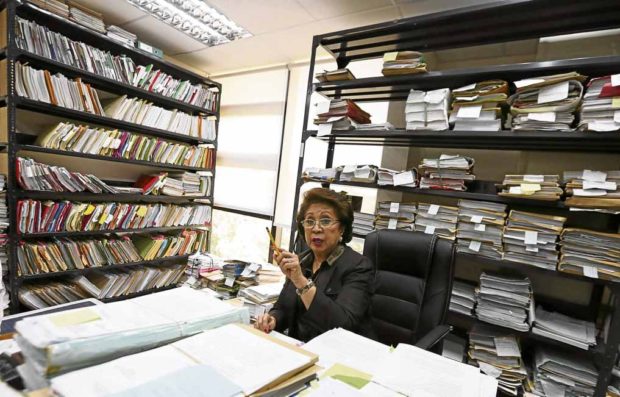
CHIEF GRAFT BUSTER Ombudsman Conchita Carpio Morales at work amid records of complaints filed in her office in this photo taken on Jan. 25, 2016. —NIÑO JESUS ORBETA
“I am the Ombudsman!”
This was the response of graft buster Conchita Carpio Morales on Thursday to criticism that she gave former President Benigno Aquino III a mere slap on the wrist in holding him accountable for the Disbursement Acceleration Program (DAP) that the Supreme Court had struck down as unconstitutional.
Morales, in a June 14 resolution, ordered the indictment of Aquino for usurpation of legislative powers, an offense punishable by a prison term of six months to six years.
She dismissed the more serious complaints of graft and technical malversation, saying Aquino and former Budget Secretary Florencio Abad acted in good faith and that they did not have actual custody of the funds.
Pursue legal options
Responding to criticism from Malacañang and lawmakers, Morales insisted she “went by the evidence,” and told detractors to pursue legal options to challenge her decision.
“If they believe there is fault and the investigation did not sit well with them, they have other options to question it,” she said.
Speaking in an interview on television on Thursday, presidential spokesperson Harry Roque said Aquino should have been charged with malversation.
“It was a very serious breach of the Constitution and I think charging him with something that would entail imprisonment of six months, which is probationable, is not proportionate to what the (Supreme) Court decided,” Roque said on the ANC program “Headstart.”
The Palace official suggested that Morales, who was appointed as Ombudsman by Aquino, sat on the case, deciding it only a month before she stepped down, which could be her way of responding to criticism that she was “guilty of selective justice.”
“I’d like always to give people the presumption of good faith, but it could have been done earlier if she wanted to,” Roque said, adding that he won arguments on the DAP in the Supreme Court four or five years ago.
“There’s a decision of the Supreme Court that the Constitution was violated. I don’t understand why it took all this time to charge him finally criminally and literally a month before she retires,” he said.
Personal benefit
Asked if he thought the case recommended against Aquino was weak, Roque said he could only surmise that Morales chose not to charge the former President with malversation because the case did not have the element of personal benefit.
“But maybe the personal benefit should have been considered not because the DAP went into one’s personal pocket but, just like what former Sen. Jinggoy Estrada had said, the funds here were used to buy votes for the impeachment of (former Chief Justice Renato Corona),” he said.
On Wednesday, President Duterte, apparently unaware that the Office of the Ombudsman had announced its resolution, said he would show one day that Morales sat on the DAP case.
“We’ll publish it,” Mr. Duterte said without elaborating in a speech at a meeting of the Philippine Councilors League in Iloilo City.
Graft, malversation
Morales responded on Thursday: “We decide on the cases when they are ripe for resolution. We do not prematurely decide cases just to cater to public expectation.”
Two senators said they believed Aquino and Abad should have been ordered indicted for graver offenses than just usurpation of legislative powers.
Sen. Richard Gordon said Aquino and Abad should be charged with graft and corruption or malversation because they appropriated budgetary savings for the DAP, thereby substituting their judgment for that of Congress.
“That is the purpose of Congress, a coequal branch of government, and then they cavalierly declare savings so they can spend the money for a purpose for which it was not intended,” Gordon said.
Sen. JV Ejercito said Aquino should be held to account for negligence, while Abad should be charged with technical malversation.
“I would think at the very least this DAP case is technical malversation, if not plunder, because of the amounts,” Ejercito told a news forum in the Senate.
He said he believed the Office of the Ombudsman recommended light charges against Aquino and Abad to save them from graver charges that Morales’ successor might bring.
Ejercito said, however, that he believed in Aquino’s integrity and honesty and that he did not think the former President pocketed the billions of pesos in public funds that went to the DAP.
“But his underlings, like Secretary Abad, like in the case of the Dengvaxia and the DAP, had the habit of using savings for other purposes,” Ejercito said.
Aquino should be held liable for negligence because he should have scrutinized the work of Abad, he added.
No money pocketed
Sen. Francis Pangilinan, president of the opposition Liberal Party, defended Aquino and Abad, saying he believed in their integrity.
“We know they will be able to ably defend themselves [against] the charges,” Pangilinan said.
Sen. Panfilo Lacson said on Wednesday that available evidence would determine if Aquino was culpable.
“What is clear, though, is that P-Noy did not pocket any money, hence the case filed is for usurpation of legislative powers and not violation of the Antigraft and Corrupt Practices Act,” he said.
The Ombudsman, in a March 3, 2017, decision, found probable cause to prosecute Abad but recommended no charges against Aquino.
The National Union of Peoples’ Lawyers, which brought the complaint on behalf of activist groups, appealed the decision, noting that the Ombudsman did not even bother to explain why Aquino was cleared.
On June 14, Morales reversed her original decision and ordered the former President indicted, noting that Abad could not have implemented the DAP without Aquino’s “unqualified approval” in June 2012. —WITH REPORTS FROM CHRISTINE O. AVENDAÑO AND ABS-CBN